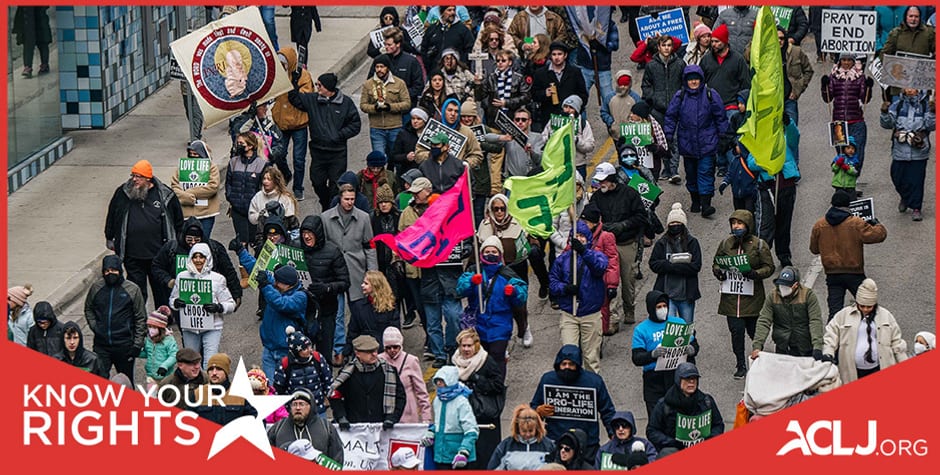Know Your Rights: Pro-Life Sidewalk Counseling and Abortion Protests Are Free Speech
Ever since abortion became a major controversy in this nation in the 1960s and 1970s, pro-life Americans have stood up against the slaughter of the innocents, and the exploitation of their mothers, entailed in abortion. These efforts have taken many forms – especially education, assistance to expectant mothers, political and legal campaigns, sit-ins, picketing, and sidewalk counseling. Unsurprisingly, supporters of abortion have sought to shut down such efforts with a variety of measures.
Here at the American Center for Law and Justice (ACLJ), we know that many legal questions arise, particularly in the context of demonstrations and sidewalk counseling at abortion businesses. The White Paper that accompanies this post addresses the basic rules governing such free speech activities. This post summarizes and supplements that paper.
Does the Constitution protect sidewalk counseling and picketing at abortion businesses? Yes, at least on public sidewalks or rights of way. However, some explanation is necessary. First, the Free Speech guarantee of the First Amendment only applies to government action. That means an owner of private property – a mall or a lot where an abortion facility is located – can refuse access to demonstrators (unless some state law or constitutional right provides for a contrary answer). Violating such directives counts as trespassing, and being a speaker is not a defense to trespass.
On the other hand, streets and sidewalks open to the public (as opposed to a private driveway or private alleyway) are normally available for pro-life individuals to speak, display signs, or distribute literature (or, on the roads, legally park or drive a car with pro-life bumper stickers or messages or signs). This is true regardless of whether the city or the private landowner technically owns the ground on which the streets or sidewalks are located.
The basic idea is that if you are allowed to be there, you bring your free speech rights with you so long as you do not break the normal rules that apply to anyone else. The government, after all, can prohibit obstruction of traffic on roads and sidewalks, excessive noise, littering, and other conduct that relates to public health and safety. Just wanting to communicate a message does not exempt a person from the normal rules of conduct. That said, so long as a person obeys these general rules, the government cannot shut down the speaker just for communicating a pro-life message.
Sometimes a locality will claim that a permit is needed to demonstrate. This may be a valid requirement for especially large groups or for marches or parades that would require diverting traffic. An example of this would be the annual March for Life in Washington, DC, each January, where the organizers obtain the proper permits and are therefore allowed to march through the streets of DC. But in general, one does not need a permit to speak, and attempts to impose a permit rule on fairly small groups of individual speakers – folks who otherwise would be allowed to gather and converse casually – are likely unconstitutional.
Other times the government – or an abortion business – will try to get a court injunction to shut down pro-life speech. Normally such efforts should not succeed unless the individuals sued are guilty of repeated lawbreaking or obstruction, but defendants are well advised to seek legal counsel in case of any such lawsuit to help present the strongest defense possible.
Finally, some government agencies try to impose speech-free fixed buffer or floating bubble zones outside abortion businesses to silence or hinder pro-life speech. The law in this area is more nuanced and fluid – though, happily, moving in a good direction – so anyone facing such restrictions (or proposed restrictions) should promptly contact the ACLJ, which has decades of experience in fighting free speech battles. No-speech zones are presumptively incompatible with the First Amendment, though strong legal efforts may be required to vindicate the speaker's rights.
We hope that the ACLJ’s accompanying White Paper helps clarify the free speech rights of pro-life sidewalk counselors and demonstrators (and others). The ACLJ is dedicated to defending your constitutional rights. We have been providing assistance and legal representation, at no cost or charge, to people just like you for decades. If your rights are being violated in this area, please contact us at ACLJ.org/HELP.
